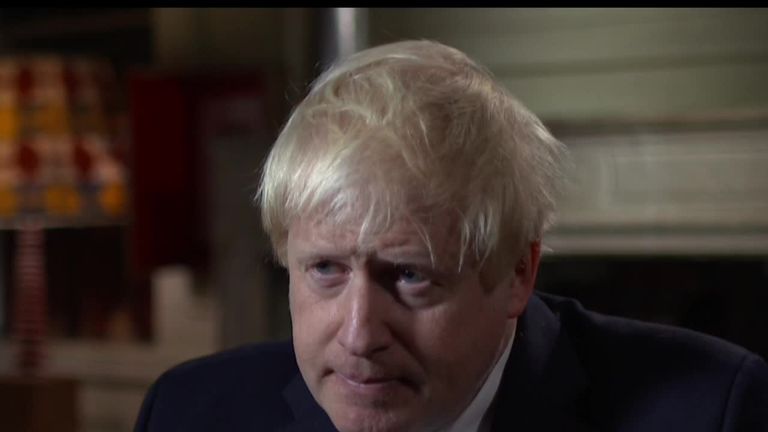Up to parties to make TV election debates happen, government says
As support builds for Sky's campaign, the Cabinet Office says the proposals are something to be considered closer to any election.
Tuesday 23 October 2018 17:48, UK
Political parties will consider proposals by Sky News for an Independent Debates Commission to organise TV debates in general elections, the government has announced.
As support builds for Sky News' campaign, the Cabinet Office has said the proposals are something to be considered in due course closer to any general election in 2022.
The government pledge came in response to a Sky News petition to parliament calling for an independent commission, which has now attracted more than 46,000 signatures.
Petitions get a response from the Government after 10,000 signatures, which took just two weeks for Sky's campaign, and after 100,000 they are considered for a Commons debate.
The campaign is aimed at taking the decision-making process for TV debates out of the hands of political parties and ensuring they become a permanent fixture in election campaigns.
Although the government has stopped short of Sky's call for a commission to be set up well before the next election campaign, it has agreed that the political parties should consider the proposal.
In its response, the Cabinet Office said: "The proposals for a debates commission are something to be considered in due course by political parties, closer to any general election in 2022.
"Televised election debates took place in the 2010, 2015 and 2017 UK parliamentary general elections.
"They form one of many mediums that enable political parties to convey their message to members of the public and address key challenges.
"Televised election debates are not mandatory under electoral law.
"Participating in a televised election debate is down to the discretion of the political party invited to debate.
"The government has no plans to change electoral law to make televised elections debates mandatory."
It added: "There are many mediums used by political parties to convey their message to members of the public.
"These include candidate hustings and political canvassing, which enables electoral candidates to debate policies and directly address members of the public in the run up to an election. These are also not mandatory under electoral law.
"Any televised material, including televised election debates, is regulated by Ofcom, the independent media regulator, and is subject to the provisions in the Broadcasting Code.
"Ofcom does not obligate broadcasters to transmit election debates, nor does it have any decision-making role over the editorial format of any programme."
Responding to the government's statement, Labour leader Jeremy Corbyn said: "I welcome any move that will guarantee general election debates so that voters can hear directly from those putting themselves forward to lead the country."
Lib Dem leader Sir Vince Cable said: "These debates are important to the election process and a precedent must be set that they are part of every general election campaign.
"It should not be in the gift of any political party to decide whether the public deserve the opportunity to scrutinise those that seek to lead this country."
Mr Corbyn and Sir Vince are among several party leaders and senior politicians to back the Sky News campaign, including Nicola Sturgeon, Sir Nick Clegg, Boris Johnson and Caroline Lucas.
After Sky News successfully lobbied for TV debates in the 2010 election campaign, three head-to-head clashes between Gordon Brown, David Cameron and Nick Clegg were held.
But since then broadcasters and politicians have failed to agree on terms and there were no head-to-head debates between the leaders of the main parties in the 2015 or 2017 general election campaigns.
In 2015 there was one seven-way debate with Mr Cameron, Labour's Ed Miliband and the leaders of the smaller parties.
Sky News also staged a "Battle for No 10" programme with Channel 4, with Mr Cameron and Mr Miliband appearing separately.
Last year Theresa May refused to debate with Mr Corbyn or other party leaders and her place was taken in one TV debate by the then home secretary Amber Rudd, who is now backing the Sky News campaign.
"I think the public do expect it and I think they're entitled to it," she says. "I think an independent commission is the only way to go."
Under the Sky News proposals, a Leaders' Debate Commission (LDC) would:
:: Set the format and rules of the debates;
:: Handle moderation;
:: Outline the criteria for political party participation;
:: Ensure the objectivity of audiences; and
:: Steer negotiations between broadcasters and parties.
When he launched the campaign on 17 September, head of Sky News John Ryley said: "This is all about doing what's best for the voting public.
"Sky News, along with the other broadcasters, changed the political landscape in this country by creating the first leaders' debates eight years ago.
"Sadly, it stands as an exception rather than the watershed it should have been.
"Political manoeuvring and failings by the broadcasters has allowed that momentum to be lost.
"Sky News believes an independent commission should set the terms for debates in future, to inform and engage the voting public with a head-to-head debate between the two political leaders battling it out for Number 10."









